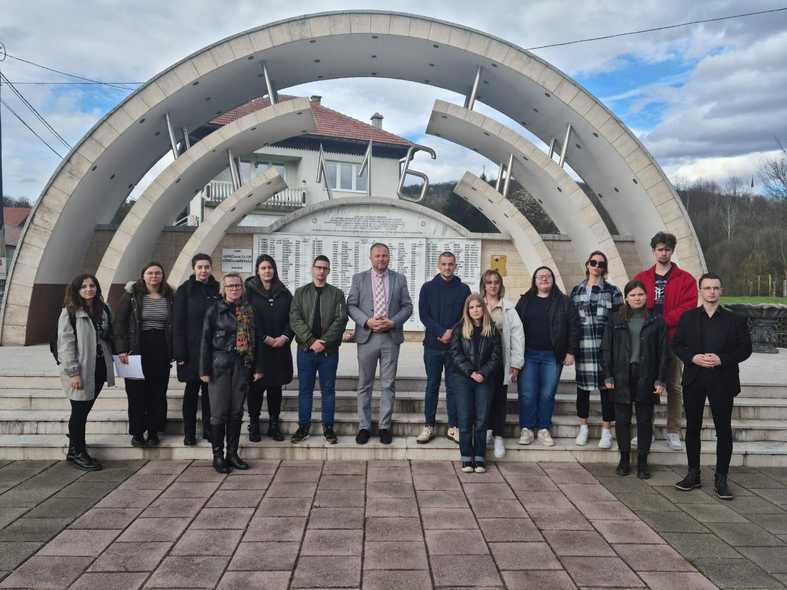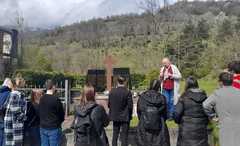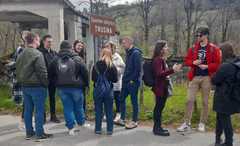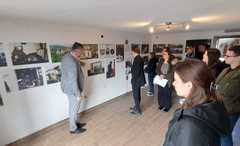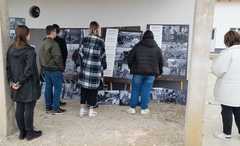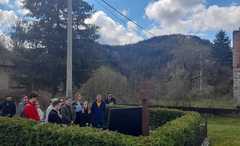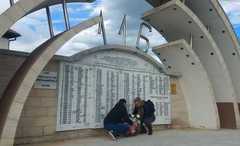Sarajevo, April 15, 2023
Young people remember the forgotten
Young activists of the Youth Initiative for Human Rights - Croatia and the Youth Initiative for Human Rights - Bosnia and Herzegovina in cooperation with the Friedrich Ebert Foundation from Bosnia and Herzegovina jointly visited Ahmići and Trusina ahead of the 30th anniversary of the war crimes committed in those places in Bosnia and Herzegovina.
Thirty years ago, on April 16, 1993, members of the Croatian Defense Council (HVO) and the special unit of the HVO Military Police, the so-called Jokers, killed 116 Bosniak civilians, among them eleven children and 32 women. Two local mosques were destroyed by explosives.
The Appeals Chamber of the International Criminal Tribunal for the Former Yugoslavia (ICTY) in the Kordić and Čerkez case confirmed the validity of the Trial Chamber's findings that the crimes against humanity in Ahmići were committed within the framework of an international armed conflict in which the Republic of Croatia exercised overall control over the military forces of the HVO.
On the same day, in Trusina, members of the RBiH Army killed fifteen civilians, and seven members of the Croatian Defense Council. They wounded four civilians, two of whom were children. The perpetrators of the crime were convicted before the Court of Bosnia and Herzegovina.
According to the research of the Wartime Nineties from the Perspective of Young People in Croatia, 80.2% of respondents, young people aged 18 to 30 from all over Croatia, had never heard of the massacre in Ahmići. The participants of the study trip from Bosnia and Herzegovina shared similarly that they had not had the opportunity to hear about the war crime in Trusina before.
Before the visit to Ahmići and Trusina, in order to remember the victims thirty years after the war crimes, young people from Croatia and Bosnia and Herzegovina gathered in Sarajevo and learned about the facts related to these war crimes as well as the judicial and social consequences of these war crimes and institutional oblivion.
The participants pointed out that they feel a duty to inform themselves and share the acquired knowledge with others, their families, friends, and the wider community because they believe that change starts with ourselves.
In Ahmići and Trusina, we met with representatives of victims' associations and religious communities to discuss the crimes committed in April 1993 and how crimes committed 30 years ago affect society today.
In Ahmići, imam Mahir ef. Husić welcomed us and took us through the memorial room. He said: "Ahmić's door is always open to all well-intentioned guests" and emphasized the following: "We are seeking the truth, we are building coexistence".
During our visit to Trusina, we had the opportunity to speak with Dragica Tomić, the president of the Konjic Association of Killed, Deceased and Missing Croatian Defenders of the Homeland War, who pointed out that "it is necessary to mark the dates of suffering, regardless of which side they occurred on. Let it be a warning for all future generations to be smarter than these generations so that such crimes never happen anywhere again," said Mrs. Dragica, and added, "Don't ever allow a war to happen anywhere. Everything can be peacefully resolved."
After visiting Ahmići and Trusina and learning about what happened, our young activists said the following:
- I felt hypocritical, I knew so much about Ahmići and nothing about Trusina.
- Every truth must be heard no matter how painful it is.
- As children of parents who survived the war, we carry trauma as much as they do. If the world remains to us, the traumas remain too, but is it our responsibility to heal other people's traumas?
- If there is no communication, if there is no recognition of the truth, can there be peace?
- Seeing us all together gives me hope for a better tomorrow.
Finally, we would like to say:
May the visit of young people from Bosnia and Herzegovina and Croatia on the occasion of the 30th anniversary of the war crimes committed in Ahmići and Trusina be:
- Inspiration to our fellow citizens to visit places of suffering and memory, and to become familiar with facts from their own past so that they never happen again.
- Imperative for the rulers to stop with nationalist policies that feed intolerance and hatred, to apologize for crimes, and to work dedicatedly and patiently to build trust and reconciliation
- Motivation for the generations born after the war to be the bearers of new progressive policies that will create opportunities for cooperation, understanding, and building a better future
Too young to remember, determined never to forget!
